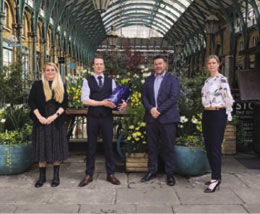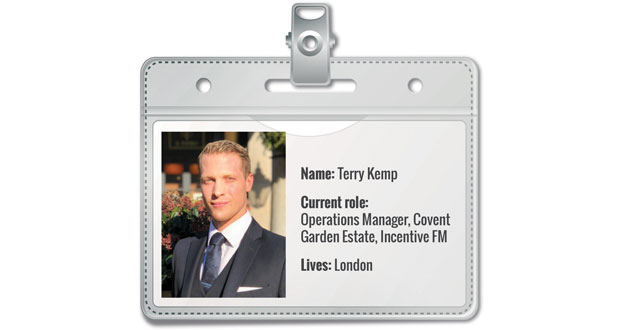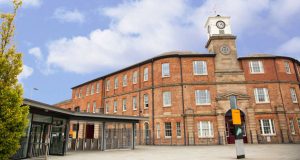Q: What first attracted you to working in FM, did you have much awareness of the profession?
After leaving the military I was unsure of the direction I should take. I was first made aware of FM when I spoke to a recruitment agent. They mentioned that ex-military personnel seem to prosper in FM due to their disciplined nature and regimented approach to tasks.
Q: How did you progress through the profession to your current role?
I started out as an Assistant FM working with a team of Senior FMs and seasoned Management Surveyors. This gave me a broad understanding of the property management sector and exposed me to an array of property portfolios and clients. I was promoted up the ranks to a Regional FM. Eventually the time came for me to spread my wings and explore new ventures. I went on to manage multi-let premier properties. I figured all the problems would be under one roof, reducing travel times and allowing me to get familiar with every nut and bolt of the building. It was great being able to apply myself to one project at a time and develop expert knowledge of the plant and equipment. During this time I was also able to complete a number of learning & development courses, including NEBOSH. With this and my recently honed technical knowledge, I was seen as a front runner to manage one of the largest estates in London made up on the Carnaby and Soho estates; a very complex portfolio with a diverse mix of residential, retail and commercial. This was my first real taste of managing within public spaces and I worked very closely with local and government agencies to deliver events and initiatives. After a couple of years, I was presented with an opportunity to manage the Covent Garden Estate which sits within the ‘Destination & Heritage sector at Incentive FM. This was an area I had walked through regularly in the 12 years prior and always wondered who managed it and if I would be capable of doing so one day. Being able to draw on my wealth of knowledge and experience, the interview process was successful, and I have worked here ever since.
Q: What have you found the most challenging experiences working in FM?
I think we can all agree that the day-to-day life of an FM is generally fast paced and high pressured, but when a major crisis occurs, such as the 2008 ‘credit crunch’ domestic terror attacks and most recently, the COVID-19 pandemic, landlords and occupiers rely heavily on their FM companies to remain composed and deliver strategies to minimise the impact on their businesses. Incentive FM are always well prepared which is the key but this does take a lot of planning and forethought to ensure when the worst happens, we are ready to take control and ride the storm.
Q: What have you found most satisfying about working in the sector?
Incentive FM looks after many heritage sites and having delivered projects and services to some of the most prestigious areas in our nation’s Capital, I feel a genuine sense of pride and a contribution to history that my children can be proud of.
Q: What qualities do you think are most needed for a successful career in FM?
It is absolutely vital that you remain flexible within your role and able to adapt to the environment and changes in requirements. We spend more time with our work colleagues than we do with our families and friends, so managing these relationships is essential. If we remain friendly and helpful it cultivates a positive and productive environment for everyone. Incentive FM has always had a great work hard play hard ethos.
Q: What has changed about your job role since the COVID-19 crisis? E.g. home working, furloughed, redeployed?
Covent Garden is a mixed-use portfolio comprising of approximately 500, commercial, residential and retail units, with vast public spaces open 24hrs a day. This meant that throughout lockdown and phased reopening there was always a job to be done.
We encountered operational difficulties in the early stages, with the majority of the management team having to work from home and a number of the site operatives having to shield. Rostering and planning became a moving-feast, and the development of new protocols and training became common place.
Q: What is your organisation doing to ensure the wellbeing of staff – whether working at home or returning to the workplace?
Incentive FM are a very altruistic organisation, the people are seen as the most important part of the business so great lengths have been taken to ensure we have remained cared for and made safe throughout the pandemic. This has included wellbeing checks for our vulnerable people, increased training & mental health awareness as well as a dedicated support service for any personal difficulties we may be experiencing.
Q: Do you believe the pandemic has highlighted the important role of the FM sector and what areas do you see as most key?
If no one noticed before how important the role of the FM sector was before, they have now. Our courageous frontline colleagues’ commuted into the fold each day, amid fears and anxiety to deliver critical services whilst the vast majority of the nation were sat at home in relative safety.
Q: What advice would you give to someone coming into the profession now?
My advice for anyone starting out in FM, is to grasp every learning and development opportunity with both hands. Attend as many workshops and seminars as possible and read around the key subjects to build upon your knowledge base. Having solid core skills will enable an FM to support their team effectively and will inspire confidence with your peers and clients, leading to further opportunities.
Q: Which of your achievements are you most proud of during your career?
Managing Covent Garden was always a dream of mine. So to not only now be managing it but to be awarded the Incentive FM Contract of the year 2020 [pictured] is a dream come true.
Q: What do you predict could be the main changes to the FM sector post pandemic?
 The big difference will be the ability to deliver services remotely and with greater flexibility. New technologies are emerging which provide the ability to monitor plant and equipment remotely. These technologies can be used in multiple applications, to improve productivity and reduce the environmental impact through reduced vehicle movement. Video calling is now common-place and is enabling employers to offer more flexibility for those with childcare commitments. This in-turn will no doubt improve staff retention and attract a new market of potential employees to the FM sector.
The big difference will be the ability to deliver services remotely and with greater flexibility. New technologies are emerging which provide the ability to monitor plant and equipment remotely. These technologies can be used in multiple applications, to improve productivity and reduce the environmental impact through reduced vehicle movement. Video calling is now common-place and is enabling employers to offer more flexibility for those with childcare commitments. This in-turn will no doubt improve staff retention and attract a new market of potential employees to the FM sector.





